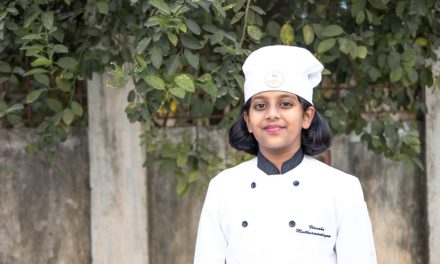Agriolabs is a Canada-based student startup that aims to tackle the food waste generated by millions of households across Canada and North America. They provide “Stackable smart in-home garden systems for fresh & sustainable veggies, even for those who can’t keep anything alive.”
“Agriolabs is one word please! It’s the combination of Agriculture (agri), Input output in the tech sense (IO), and labs, for our research and development.”
says Jonathan Mui, CEO Agriolabs
CAMPUSTYCOONS met with the team to find out how it all started and what plans they have for the future. Read on for an interesting conversation with Jonathan Mui, Founder and CEO of Agriolabs.
Tell us a little bit about your background.
I’ve always been into technology, but not in the sense that I learned how to code before I spoke, like some child prodigies, I actually didn’t learn to code until I was at NAIT.
Instead, I was that kid that would take apart the microwave just to see how it worked and put it all back together before mom was home. My favorite thing as a kid was probably the screwdriver, and it also was something my mom should’ve kept out of my hands the most.
I’ve never been afraid of doing something on my own either, whether it be selling random snacks on the corner of my street as a kid to make some extra money, to selling over 200 bottles of homemade gingerale after I quit my retail job when I was 17.
That being said, I don’t hate jobs, or the 9 to 5 either. I’ve had plenty of regular jobs, and even a web designer position during my first year at NAIT. I just tend to get bored easily with a job if there’s no progression, and building your own business is always just more exciting and meaningful.
I’m have just freshly graduated from the Digital Media and IT program at NAIT this April. In my program, I specialized in Web Design and Development with a strong focus in user experience. This focus on user experience and the love for beautiful and highly-usable things influences a lot of decisions made in terms on Agriolabs’ products and branding.

What is the story behind starting Agriolabs?
Food waste and self-sufficiency were probably the two biggest motivators.
Growing up, my mom would threaten to send me off to a 3rd world country if I didn’t appreciate the food I had and wasted it. That mindset that food was precious and not something we should waste, will probably be engrained in me for the rest of my life.
When I moved out of my mother’s home in 2019, one of the first things I noticed was just the sheer amount of produce I was wasting. I would buy fresh leafy veggies and herbs, and they would almost always go bad within the week and being a busy student with no time to cook didn’t help.
The simplest solution to the problem I could think of was to have my own mini garden in my basement suite apartment. Existing countertop grow systems were both too expensive and too large for my tiny apartment. Just one grow system would essentially take up my entire kitchen countertop!
I thought about just growing some greens in a container, but honestly, I didn’t know anything about growing plants other than that they needed light and water. Also, I tend to kill just about anything I try to grow, either by forgetting to water, over watering, or just not having any sunlight in my apartment.
I began experimenting microgreens. Microgreens seemed easy enough to grow, and they were amazing when I tried them at the OEB restaurant in downtown Edmonton (still one of my favourite places in town).
Unfortunately, they need quite a bit of maintenance as well, from misting often to avoiding mold. So I started experimenting with an automated system, and began building the initial prototypes of what is now known as the Micro with my 3D printer.
What was the source of your initial funding for AGRIO LABS?
Agriolabs was all initially self-funded, and still mostly is. I received some funding from NAIT through winning pitch competitions and an innovation challenge. Recently we’ve also received some funding from family but otherwise, no external funding.

What is your mission, and do you see yourself continuing with this effort even after graduating?
The mission is to enable anyone to grow fresh produce indoors, effortlessly & efficiently all year round. Of course, I’m continuing to build this company after graduating. It’s not just a fun little project, I’m taking it very seriously and sink all my waking hours into it.
Who all have been influential in this journey?
Some of the biggest influences include the Mawji Center (special shout out to Cecile) who have opened up countless opportunities for us, and connected us with amazing people who have helped us and continue to help us in this journey.
Kelso Brennan, an amazing serial entrepreneur in Edmonton that Cecile had introduced to me early on, who, despite being super busy with his family and multi-million-dollar deals, still finds the time to respond to my texts.
Will Kabrall, the VP of marketing at Social Hero, he’s a close friend and marketing genius. His genius comes from his ability to test, learn, and adapt incredibly quickly, and he’s provided me with countless learning resources and advice. He’s also joining the Agriolabs team to help with our kickstarter campaign in the near future.
Eric Chaba, my best friend from childhood. This is the guy that I started the company with, made the prototypes and designs with, and now is the CFO & VP of product engineering at our company, taking on product design and finances as his main duties. Incredible guy, and really good problem-solving skills.
What are some of the challenges you see in being a student entrepreneur?
The entire year I was building Agriolabs and in my final year of the DMIT program, it was a massive struggle. Juggling full time school and growing a business into more than just an idea requires ridiculous amounts of dedication, time, and energy. I would joke to myself about quitting all the time, knowing I would never quit (sinking your savings into a startup kinda removes the whole option to quit). But seriously, it was utter hell. So many things going on at once, so many internal and external deadlines. Being accountable was difficult but important. I’m not the type to just aim for a passing grade even though I may joke about it, especially in DMIT since I was so passionate about web design and development, but sometimes you have to make sacrifices. Done is better than perfect, right?
How much time do you and your team spend working on your company?
I would say I spend more time on my company than my team of 3 people combined. From waking till sleep, whatever ungodly hours those are. It is a labor of love. I put all this time, energy and money in because I thoroughly believe in my business. And even when my own belief sways, other people like our mentors and our fans all keep me going. If I did track my time, it’d probably be around 80-100 hours a week now that I’ve graduated, but during school it was probably closer to 20-40 hours a week.
Do you see academics getting affected?
Unfortunately, yes. I really loved everything I was doing in my program and wanted to do good. However, there’s a limit to how much work anyone can do before they just get burnt out.
What is the one thing that keeps you going?
Results are what drive me, whether that be a new awesome prototype, or more social media followers and press recognition, or getting money from winning a competition or award.
Seeing results is the most fulfilling thing in business and it makes it all feel real.
What are some things you wish you knew a year (or two) ago?
- Do the Work. No work = No results.
You can talk all you want about hard work vs smart work. But you need to put in the work. I work smart and hard. I automate as much as I can, and design systems to achieve results I want, but it’s still hard work.
- Take a Break. No rest = No results
I don’t know about you, but I get incredibly dumb when I’m overworked and burnt out. When I get to that point, I have to recognize that I’d be more productive after I play some video games and have a good nap.
- Believe in yourself.
I still have trouble with this sometimes, but my way of seeing it is, when everyone else believes in you, why wouldn’t you believe in yourself?
The first step to doing anything great is believing you can. Sounds cliché, I know.
- Have fun!
Having fun doing something you’re passionate about makes it feel like play and not work, as cliché as it sounds, it helps with all of the above.
How do you prioritize your activities in a day/ week?
- What am I passionate about the most?
- What will bring the most results?
- What is both?
“Our long term plan is to feed Elon Musk’s martian colony and other deep space journeys. Hence why efficiently, ease of use, and use of space is very important in our product designs”, says Jonathan.
We at CAMPUSTYCOONS wish Agriolabs a great journey ahead.





